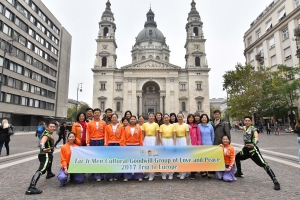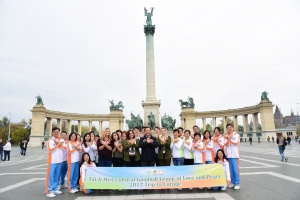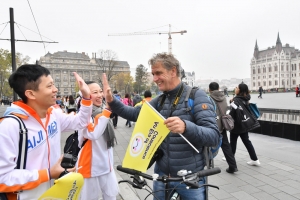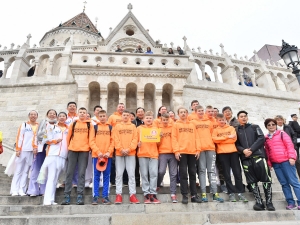Angels Visit Hungary to Deliver Music of Peace
 (Susan Wu Reporting from Hungary) Europe is a place where Eastern and Western cultures come together and where diverse religions and nationalities meet. On Oct. 22, 2017, Dr. Hong, Tao-Tze, president of the Federation of World Peace and Love (FOWPAL), led a cultural goodwill delegation to Hungary. The Hungarians have been a distinct people for over 3,000 years, and the original Hungarians settled in today’s Hungary over 1,000 years ago. Hungary, a landlocked nation situated in Central Europe, has experienced the First and Second World Wars. Hungary has been attacked and invaded multiple times in the past; many of its historical relics and artifacts were destroyed. Nevertheless, many aspects of its rich and precious traditional culture have been preserved. The delegation visited historical structures to gain a better understanding of Hungarian culture.
(Susan Wu Reporting from Hungary) Europe is a place where Eastern and Western cultures come together and where diverse religions and nationalities meet. On Oct. 22, 2017, Dr. Hong, Tao-Tze, president of the Federation of World Peace and Love (FOWPAL), led a cultural goodwill delegation to Hungary. The Hungarians have been a distinct people for over 3,000 years, and the original Hungarians settled in today’s Hungary over 1,000 years ago. Hungary, a landlocked nation situated in Central Europe, has experienced the First and Second World Wars. Hungary has been attacked and invaded multiple times in the past; many of its historical relics and artifacts were destroyed. Nevertheless, many aspects of its rich and precious traditional culture have been preserved. The delegation visited historical structures to gain a better understanding of Hungarian culture.
 Known as the "Pearl of the Danube," Budapest is listed as a World Heritage Site by UNESCO. The city is full of buildings and monuments that span different historical periods, such as St. Stephen's Basilica; the Matthias Church; the Fisherman's Bastion, which fuses neo-Romanesque and neo-Gothic styles; and the Hungarian Parliament building, which was built at the end of the 19th century.
Known as the "Pearl of the Danube," Budapest is listed as a World Heritage Site by UNESCO. The city is full of buildings and monuments that span different historical periods, such as St. Stephen's Basilica; the Matthias Church; the Fisherman's Bastion, which fuses neo-Romanesque and neo-Gothic styles; and the Hungarian Parliament building, which was built at the end of the 19th century.
The construction of St. Stephen's Basilica, the tallest and most magnificent church in Budapest, started in 1851 to commemorate Saint Stephen I. After three architects and over 50 years, the church was completed in 1905. In the 9th century, the nomadic Hungarian tribe in Central Asia migrated westwards and settled in the Danube Basin. In the year 1000, the Grand Prince of the Hungarians was crowned the king of the Kingdom of Hungary by the Pope for his promoting Catholicism.  Because the king transformed the nomadic tribe into a feudal nation, he was Hungary's national hero. He was honored as a saint after his death and became known as St. Stephen. He once said that if a country has only a single language and custom, it will be weak and can easily disintegrate. His advocating reforms and opening up has had a great impact on later generations, allowing Hungary to have a distinct culture and close ties with other civilizations in Western Europe. Before the St. Stephen's Basilica, members of the FOWPAL delegation shared with locals a beautiful song called Happiness Is Everywhere, while emphasizing that an open mind and mutual respect among people will create happiness everywhere.
Because the king transformed the nomadic tribe into a feudal nation, he was Hungary's national hero. He was honored as a saint after his death and became known as St. Stephen. He once said that if a country has only a single language and custom, it will be weak and can easily disintegrate. His advocating reforms and opening up has had a great impact on later generations, allowing Hungary to have a distinct culture and close ties with other civilizations in Western Europe. Before the St. Stephen's Basilica, members of the FOWPAL delegation shared with locals a beautiful song called Happiness Is Everywhere, while emphasizing that an open mind and mutual respect among people will create happiness everywhere.
The well-known Heroes' Square, which combines history, arts, and politics, was built in 1896 to commemorate the 1000th anniversary of the establishment of the Hungarian state. Its construction was overseen by famous sculptors and architects. On both sides of the square stand the statues of the heroes of the past. At the center of the square stands the 36-meter-high Millennium Monument; on top of the pillar is the Archangel Gabriel. It is very lifelike, as if it has come down from heaven. On the stone pedestal are 7 bronze statues of heroic knights who are the tribal leaders that led the Hungarian people to settle in today’s Hungary. Hungarians have experienced many wars and conflicts; the Heroes’ Square not only commemorates their historical heroes but also symbolizes their yearning for a bright future. Ceremonies are held here during major holidays or during visits by foreign heads of state. Members of the FOWPAL delegation sang songs of love and peace at the square. Many tourists and students stopped to listen and danced to the songs, and they expressed their aspirations for peace through the “hand gestures of doves.”
 The delegation visited the Hungarian Parliament building, Fisherman's Bastion, and many other places. Before the magnificent Parliament building, the delegates’ cheerful singing attracted many people to join them. Although they are from different language, ethnic, and cultural backgrounds, the FOWPAL delegates, tourists, and locals held hands and danced in a big circle. The smiley banners of the movement of An Era of Conscience became the most popular commemorative gifts. The delegation coincidentally met Poland’s basketball team members at the Fisherman’s Bastion and took a group photo with them. Seizing the opportunity of meeting these people in Hungary, the FOWPAL delegates sang peaceful songs to spread the message of love and peace. Many buildings in Hungary still bear signs of wars from the past. Bullet holes in the walls and the buildings’ mottled appearance create a poignant atmosphere that speaks of Budapest’s dark history. The delegates gained a deeper understanding of the importance of peace as they visited these historical structures and buildings.
The delegation visited the Hungarian Parliament building, Fisherman's Bastion, and many other places. Before the magnificent Parliament building, the delegates’ cheerful singing attracted many people to join them. Although they are from different language, ethnic, and cultural backgrounds, the FOWPAL delegates, tourists, and locals held hands and danced in a big circle. The smiley banners of the movement of An Era of Conscience became the most popular commemorative gifts. The delegation coincidentally met Poland’s basketball team members at the Fisherman’s Bastion and took a group photo with them. Seizing the opportunity of meeting these people in Hungary, the FOWPAL delegates sang peaceful songs to spread the message of love and peace. Many buildings in Hungary still bear signs of wars from the past. Bullet holes in the walls and the buildings’ mottled appearance create a poignant atmosphere that speaks of Budapest’s dark history. The delegates gained a deeper understanding of the importance of peace as they visited these historical structures and buildings.
